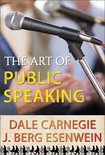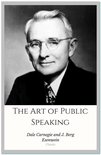The Art of Public Speaking
Afbeeldingen
Sla de afbeeldingen overArtikel vergelijken
Uitgever: Createspace Independent Publishing Platform
- Engels
- Paperback
- 9781519169624
- 09 november 2015
- 422 pagina's
Dale Carnegie
Samenvatting
Productspecificaties
Inhoud
- Taal
- en
- Bindwijze
- Paperback
- Oorspronkelijke releasedatum
- 09 november 2015
- Aantal pagina's
- 422
- Illustraties
- Nee
Betrokkenen
- Hoofdauteur
- Dale Carnegie
- Tweede Auteur
- Dale Carnagey
- Hoofdredacteur
- Gp Editors
- Hoofduitgeverij
- Createspace Independent Publishing Platform
Overige kenmerken
- Extra groot lettertype
- Nee
- Product breedte
- 152 mm
- Product hoogte
- 22 mm
- Product lengte
- 229 mm
- Studieboek
- Ja
- Verpakking breedte
- 152 mm
- Verpakking hoogte
- 22 mm
- Verpakking lengte
- 229 mm
- Verpakkingsgewicht
- 562 g
EAN
- EAN
- 9781519169624
Je vindt dit artikel in
- Categorieën
- Taal
- Engels
- Boek, ebook of luisterboek?
- Boek
- Studieboek of algemeen
- Algemene boeken
Reviews
Negatief, positief, neutraal: we zetten een review altijd online. We controleren wel eerst of ’ie voldoet aan onze reviewvoorwaarden en niet nep is. We controleren ook of ’ie is geschreven door iemand die het artikel heeft gekocht via bol.com en zetten dit er dan bij. De controles gebeuren automatisch, al kijken er soms mensen mee. Bol.com betaalt niet voor reviews. Als een reviewer door een andere partij is vergoed, staat dit in de review zelf.
Negatief, positief, neutraal: we zetten een review altijd online. We controleren wel eerst of ’ie voldoet aan onze reviewvoorwaarden en niet nep is. We controleren ook of ’ie is geschreven door iemand die het artikel heeft gekocht via bol.com en zetten dit er dan bij. De controles gebeuren automatisch, al kijken er soms mensen mee. Bol.com betaalt niet voor reviews. Als een reviewer door een andere partij is vergoed, staat dit in de review zelf.
-
Ordered hardcover book received paperback...
Geschreven bij The Art of Public Speaking: The Original Tool for Improving Public Oration
The title says it all.
Vond je dit een nuttige review?03
Kies gewenste uitvoering
Prijsinformatie en bestellen
Alle bindwijzen en edities (7)
-
3,99Direct beschikbaar
-
2,99Direct beschikbaar
-
3,99Direct beschikbaar
-
0,99Direct beschikbaar
-
3,88Direct beschikbaar
-
15,99Op voorraad. Voor 23:59 uur besteld, dinsdag in huis
Levertijd
We doen er alles aan om dit artikel op tijd te bezorgen. Het is echter in een enkel geval mogelijk dat door omstandigheden de bezorging vertraagd is.
Bezorgopties
We bieden verschillende opties aan voor het bezorgen of ophalen van je bestelling. Welke opties voor jouw bestelling beschikbaar zijn, zie je bij het afronden van de bestelling.
Tooltip -
10,73Op voorraad. Voor 23:59 uur besteld, maandag in huis
Levertijd
We doen er alles aan om dit artikel op tijd te bezorgen. Het is echter in een enkel geval mogelijk dat door omstandigheden de bezorging vertraagd is.
Bezorgopties
We bieden verschillende opties aan voor het bezorgen of ophalen van je bestelling. Welke opties voor jouw bestelling beschikbaar zijn, zie je bij het afronden van de bestelling.
Tooltip
Rapporteer dit artikel
Je wilt melding doen van illegale inhoud over dit artikel:
- Ik wil melding doen als klant
- Ik wil melding doen als autoriteit of trusted flagger
- Ik wil melding doen als partner
- Ik wil melding doen als merkhouder
Geen klant, autoriteit, trusted flagger, merkhouder of partner? Gebruik dan onderstaande link om melding te doen.







